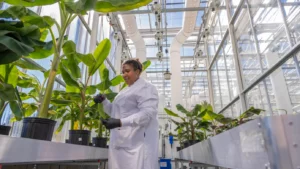
The global food market is in dire need of being reinvented with technologies that can help deliver new crops and ingredients that are more nutritious, taste better and are more sustainable for the planet.
That was the key theme that emerged from a panel discussion during a recent World Agri-Tech Innovation Summit in San Francisco.
The panelists discussed everything from advanced breeding systems to molecular farming to regulatory hurdles as new technology offers disruptive ideas and products to improve our global food system.
Our CEO, Todd Rands, said his Elo’s mission was to make food healthier and more sustainable using molecular farming.
While we can go out in nature and find a wide range of amazing ingredients in plants, he said, they’re rare, hard to get enough of from natural sources—and there’s no way to scale and produce them for our food system.
“We can reengineer that and produce, at scale, using plants essentially as biofactories,” Rands said.
 “This gives that natural pathway that we can engineer into those plants, with the rest of the part of the factory provided by the plant. Now, food and beverage companies have whole new tools to work with as they create new and interesting consumer experiences.”
“This gives that natural pathway that we can engineer into those plants, with the rest of the part of the factory provided by the plant. Now, food and beverage companies have whole new tools to work with as they create new and interesting consumer experiences.”
Indeed, Tom Adams, CEO of Pairwise, said previous technologies were focused on what animals consumed, not what people consumed.
He added that there was a lot of value and opportunity in creating crops that fit into people’s lives—using technology to do so.
“We created a leafy green that has nutritional value like kale but has the crunch and taste of romaine,” he said, noting that it was possible with CRISPR technology.
Shimpei Takeshita, president representative director of Sanatech Seed, talked about the Japanese startup’s GABA-enriched tomato, its first CRISPR-edited food to enter the market in 2021.
These tomatoes, popular in Japan, contain high levels of gamma-aminobutyric acid (GABA), an amino acid believed to aid relaxation, lower blood pressure, and sharpen mental acuity.
“Without this gene-editing technology,” Takeshita said, “these kinds of high concentration GABA tomatoes cannot happen.”
While there are challenges, including existing, outdated regulatory frameworks, the panelists see a bright future.
“We can improve crops that, traditionally, have been overlooked,” Rands said. “And they’re not commodities, but incredibly important staples to the world’s diet.”
 Rands noted that Elo Life Systems was solving a crisis affecting Cavendish, the most commonly available banana variety. In short, this banana is facing extinction due to a fungus ravaging roots in banana farms around the world.
Rands noted that Elo Life Systems was solving a crisis affecting Cavendish, the most commonly available banana variety. In short, this banana is facing extinction due to a fungus ravaging roots in banana farms around the world.
“We’re using [our unique] genetic engineering and gene-editing tools to accelerate what normally would have taken decades of breeding to bring genes over from related crops and species of bananas,” he said. “We’ve advanced the breeding so that it’s disease-resistant and can survive.”
In other words, new companies and products are changing the narrative from a heavy focus on farming efficiency to a focus on providing better tasting ingredients that provide more nutrition, not just calories, the latter of which was a strategy that dates to World War II.
“Now we have a very different set of problems that we’re solving for, with human health, chronic diseases, climate change,” Rands said. “When people see the benefit of what we’re going to deliver to a new generation of products, it wins hearts and minds and changes their experiences with the foods and why they’re buying the things they’re buying. And that’s the winning formula.”
